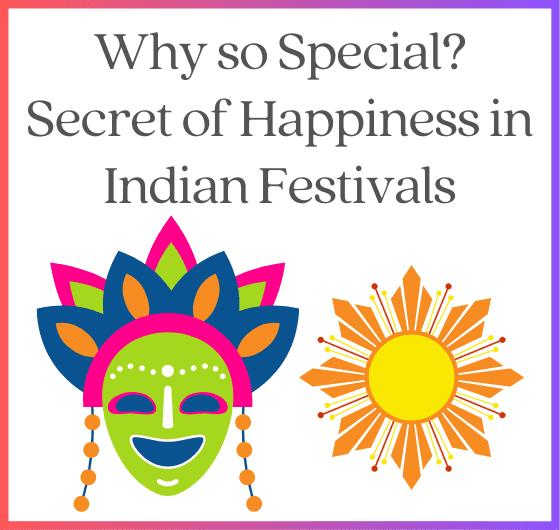Indian festivals are known for their vibrant colors, music, and joyful celebrations. But did you know that these festivals also hold secrets to unlocking happiness? The joy and positivity that radiate from these festivities are a testament to the Indian culture’s deep understanding of emotional well-being and contribute to Happiness in Indian festivals.
From Diwali, the festival of lights, to Holi, the festival of colors, each festival represents a unique aspect of life that is celebrated with enthusiasm and devotion.
By embracing the spirit of these festivals and incorporating their values into our daily lives, we can unlock the secrets to lasting happiness. Indian festivals teach us to find joy in the present moment, appreciate our loved ones, and cultivate gratitude for all that we have in our lives.
Importance of Diwali in bringing happiness
Diwali, also known as the Festival of Lights, is one of the most widely celebrated festivals in India. It is a time of joy, unity, and the triumph of good over evil.
The festival is celebrated by lighting diyas (lamps) and candles, bursting firecrackers, and exchanging sweets and gifts with loved ones.
Diwali holds great significance in Indian culture and is believed to bring happiness and prosperity to those who celebrate it.
“Indian festivals are not just celebrations, they are a way of life that teaches us to be happy and spread happiness.”
The secret of happiness in Indian festivals like Diwali lies in the spiritual and cultural significance behind them. Diwali is a celebration of the victory of Lord Rama over the demon king Ravana, signifying the triumph of good over evil.
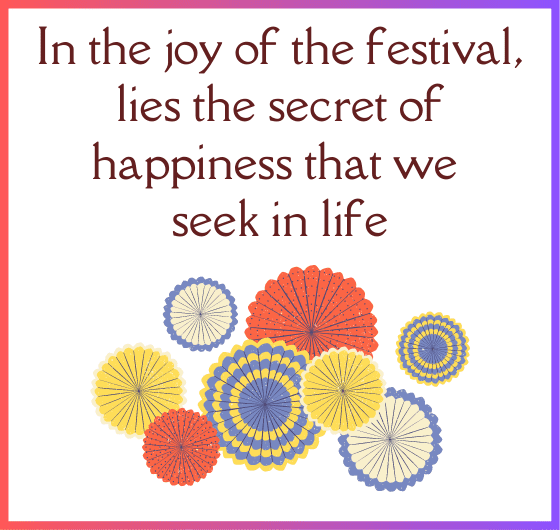
The festival also marks the return of Lord Rama and his wife Sita to Ayodhya after 14 years of exile. It is said that the people of Ayodhya welcomed them by lighting diyas, hence the tradition of lighting diyas during Diwali.
Diwali is a time to reflect on the triumph of good over evil in our own lives. It is a time to let go of negative emotions and focus on positivity and love. By doing so, we can invite happiness and abundance into our lives.
One of the ways to celebrate Diwali is by cleaning and decorating our homes. This represents the idea of letting go of the old and welcoming the new.
It is believed that Goddess Lakshmi, the goddess of wealth and prosperity, enters homes that are clean and well-decorated. This is why people also light diyas and candles to welcome her.
Another way to celebrate Diwali is by bursting firecrackers. While this tradition has been criticized for its negative impact on the environment and health, it is important to remember that the intention behind bursting firecrackers is to ward off evil spirits.
In the same way, we can ward off negative thoughts and emotions by focusing on positivity and spreading love and kindness.
Diwali is also a time to come together with family and friends. It is a time to share food, sweets, and gifts, and to strengthen our relationships. By doing so, we create a sense of unity and belonging, which is essential for our happiness and well-being.
In conclusion, the secret of happiness in Indian festivals like Diwali lies in the spiritual and cultural significance behind them. By focusing on positivity, letting go of negative emotions, and spreading love and kindness, we can invite happiness and prosperity into our lives.
Diwali is a time to reflect on the triumph of good over evil, and to come together with family and friends to celebrate life and all its blessings.
“In the joy of the festival, lies the secret of happiness that we seek in life.”
How can we spread happiness on Diwali?
To spread happiness on Diwali, we can take simple actions that bring joy to others.
** Firstly, sharing sweets and gifts with friends, family, and neighbors can bring smiles and warmth.
** Additionally, lighting up homes and neighborhoods with beautiful diyas (lamps) and colorful decorations creates a festive and cheerful atmosphere.
** Donating to charities and helping those in need spreads happiness and blessings.
** Finally, reaching out to loved ones with heartfelt wishes and spending quality time together strengthens bonds and creates lasting memories.
By embracing these gestures of kindness, we can collectively spread happiness and make Diwali a truly joyful and uplifting celebration for everyone.
Summarizing in bullet points:
>> Share sweets and gifts with friends, family, and neighbors.
>> Light up homes and neighborhoods with diyas (lamps) and colorful decorations.
>>Donate to charities and help those in need.
>> Reach out to loved ones with heartfelt wishes.
>> Spend quality time together with family and friends.
>> Embrace acts of kindness and spread positivity throughout the community.
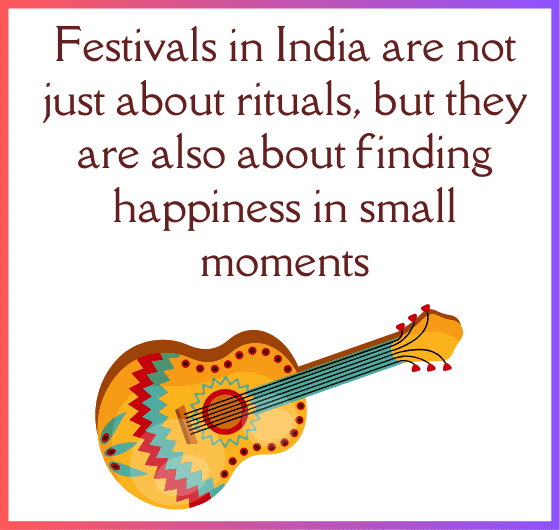
The Significance of Holi in Promoting Joy and Happiness
Holi, also known as the festival of colors, is a Hindu festival celebrated in India and many other parts of the world. The festival symbolizes the victory of good over evil and the arrival of spring. Holi is a time to forget all differences and celebrate the spirit of togetherness, happiness, and love.
The Secret of Happiness in Indian Festivals lies in the essence of Holi. The festival is a perfect example of how happiness and joy can be shared with loved ones, regardless of their backgrounds or beliefs. The vibrant colors and playful water fights of Holi bring a sense of liberation and renewal.
Holi is a reminder that life should be filled with joy and playfulness. It encourages us to let go of our worries and embrace the present moment. The festival promotes forgiveness, as people come together to reconcile their differences and start afresh.
Holi teaches us to let go of grudges and resentments and open our hearts to love and positivity.
The significance of Holi can also be seen in the various traditions associated with the festival. One such tradition is the burning of the Holika bonfire the night before Holi. This ritual symbolizes the triumph of good over evil and the destruction of negativity.
Another tradition is the sharing of sweets and delicacies, such as gujiya and thandai, with friends and family. This tradition reinforces the importance of sharing and spreading happiness with those around us.
In conclusion, Holi is an important festival that promotes happiness, joy, and togetherness. The Secret of Happiness in Indian Festivals can be found in the essence of Holi, which encourages us to let go of our worries and embrace the present moment with love, forgiveness, and positivity.
So, this Holi, let us all come together to celebrate the festival of colors and spread happiness and joy with our loved ones.
“Festivals in India are not just about rituals, but they are also about finding happiness in small moments.”
Is Holi a celebration of joy?
Holi is indeed a celebration of joy. It is a vibrant and lively festival celebrated in India and other parts of the world. Holi signifies the arrival of spring and the triumph of good over evil.
During this festival, people play with vibrant colors, spray water, and dance to lively music. It is a time of pure fun and merriment, where people let go of their inhibitions and embrace the spirit of joy.
Holi brings people together, breaking barriers of age, gender, and social status.
It is a time to spread happiness, forgiveness, and love. Holi truly embodies the essence of celebration and brings immense joy to all who participate.
The connection between Raksha Bandhan and happiness
Raksha Bandhan is a joyous occasion that celebrates the bond between siblings. This festival is an expression of love, trust, and protection between brothers and sisters. The festivities involve tying a sacred thread called “Rakhi” on the wrist of the brother by the sister. It symbolizes the brother’s vow to protect his sister and the sister’s prayers for her brother’s well-being.
The festival also promotes happiness in other ways. It is an opportunity for families to come together and celebrate. The exchange of gifts and sweets adds to the joy of the occasion.
The festivities also promote the idea of forgiveness and reconciliation, as siblings may use the opportunity to resolve any past conflicts and start anew.
The secret of happiness in Indian festivals, including Raksha Bandhan, lies in their ability to bring people together and promote a sense of community.
Festivals like Raksha Bandhan promote love, trust, and forgiveness, which are important for overall happiness and well-being. By celebrating these festivals, people can strengthen their relationships, create happy memories, and experience joy in the simple things in life.
What is the moral value of Raksha Bandhan?
The moral value of Raksha Bandhan is profound. It is a festival celebrated in India to honor the special bond between brothers and sisters.
Raksha Bandhan signifies the pledge of protection and love. On this day, sisters tie a sacred thread, known as Rakhi, around their brothers’ wrists, and in return, brothers promise to protect and support their sisters throughout their lives.
This festival promotes the values of love, trust, and respect between siblings. It teaches us the importance of nurturing and valuing family relationships.
Raksha Bandhan reminds us of the moral duty to care for and safeguard our loved ones, fostering a sense of unity, affection, and responsibility among siblings.
What is the best message of Happy Raksha Bandhan?
The best message of Happy Raksha Bandhan is one that expresses love, gratitude, and the bond between siblings. It is a day to celebrate and cherish the special connection shared between brothers and sisters.
The message of Raksha Bandhan conveys a promise of protection, care, and support for each other. It is a time to acknowledge and appreciate the unique role that siblings play in our lives.
The message could include heartfelt wishes for happiness, success, and well-being.
Ultimately, the best message of Happy Raksha Bandhan is one that reminds us of the deep love and lifelong commitment we have for our siblings, strengthening the bond and bringing joy to this special occasion.
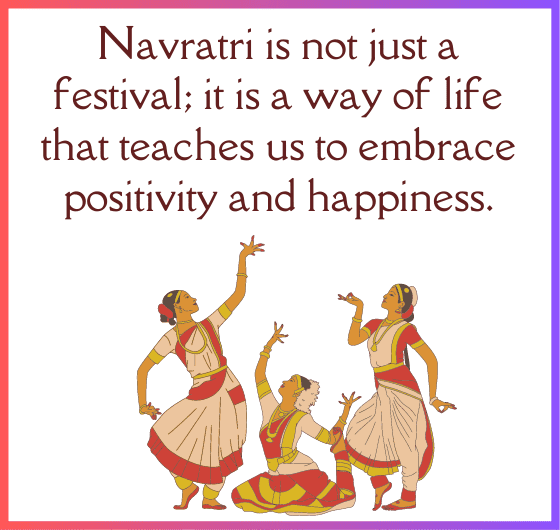
How Navratri brings positivity and happiness in life
Navratri is one of the most significant festivals celebrated in India, and it is known for its lively and colorful celebrations. It is a festival that is dedicated to the worship of the Hindu goddess Durga and is celebrated with much zeal and enthusiasm.
The festival is spread over nine days, and each day is associated with the worship of a different form of the goddess. The festival is not just about the worship of the goddess, but it also brings positivity and happiness into people’s lives.
Navratri is all about celebrating the triumph of good over evil and spreading positivity and happiness. During this time, people indulge in various rituals and customs to celebrate the festival.
They decorate their houses, dress up in traditional attire, and participate in cultural events like Garba and Dandiya. These activities not only bring people together but also create a positive and happy atmosphere.
“The spirit of togetherness during Indian festivals unlocks the door to happiness, which is often hidden in our busy lives.”
Apart from the cultural significance, Navratri also has a spiritual significance. It is believed that during these nine days, the goddess Durga blesses her devotees with good health, prosperity, and happiness.
The festival also marks the change of season, and it is believed that worshipping the goddess during this time helps in warding off negative energies and brings in positive energies.
The secret of happiness in Indian festivals like Navratri lies in the celebration of life and the belief in the power of positivity. The festival encourages people to spread love, kindness, and happiness, and it brings people together irrespective of their caste, creed, or religion.
Navratri is not just a festival; it is a way of life that teaches us to embrace positivity and happiness.
In conclusion, Navratri is a festival that celebrates the triumph of good over evil and brings positivity and happiness into people’s lives. It is a time to celebrate life and the power of positivity. The festival teaches us to spread love, kindness, and happiness, and it brings people together.
The secret of happiness in Indian festivals like Navratri lies in the celebration of life and the belief in the power of positivity.
What are the benefits of doing Navratri Pooja?
Doing Navratri pooja offers several benefits for individuals. Firstly, it promotes spiritual growth and devotion. Engaging in the rituals and prayers during Navratri helps to deepen one’s connection with the divine.
It instills a sense of peace and calmness in the mind. Secondly, Navratri pooja encourages self-discipline and self-control. Fasting during this period allows the body to detoxify and purify.
It also helps to cultivate willpower and discipline. Additionally, Navratri pooja brings people together in celebration, fostering a sense of community and unity.
It allows for cultural and social bonding, creating an atmosphere of joy and harmony. Overall, Navratri pooja brings spiritual, physical, and social benefits to those who participate.
Ganesh Chaturthi and the impact of celebrations on happiness
Ganesh Chaturthi, also known as Vinayaka Chaturthi, is a Hindu festival that celebrates the birth of Lord Ganesha, the god of wisdom, knowledge, and new beginnings. The festival is celebrated with great enthusiasm and devotion all over India, especially in Maharashtra.
The celebration of Ganesh Chaturthi brings immense joy and happiness to people’s lives. The colorful decorations, the delicious sweets, and the lively music all contribute to the festive atmosphere. But there is much more to this festival than just the external celebrations.
Ganesh Chaturthi teaches us valuable lessons about happiness and contentment. Lord Ganesha is revered as the remover of obstacles and the one who brings happiness and success. The festival encourages us to cultivate a positive mindset, overcome obstacles, and welcome new beginnings.
Celebrating Ganesh Chaturthi with family and friends can bring people closer together and strengthen relationships. It also teaches us the value of community, as people come together to celebrate and offer prayers to Lord Ganesha.
“Indian festivals remind us that happiness is not just a state of mind, but it can be found in our traditions, customs, and culture.”
Overall, the celebration of Ganesh Chaturthi can have a profound impact on our happiness and well-being. By embracing the spirit of the festival and practicing its teachings in our daily lives, we can experience a greater sense of joy, contentment, and fulfillment.
The Secret of Happiness in Indian Festivals lies in the ability of these celebrations to bring people together, teach valuable lessons, and promote positive emotions.
Ganesh Chaturthi is just one example of how Indian festivals can have a powerful impact on our happiness and well-being.
What values do we learn from Ganesh Chaturthi?
Ganesh Chaturthi, a festival celebrated in India, imparts valuable life lessons and values. Firstly, it teaches us the importance of humility.
Lord Ganesha, the deity worshipped during this festival, is known for his humility despite being the son of Lord Shiva and Goddess Parvati. Secondly, Ganesh Chaturthi emphasizes the value of perseverance.
Lord Ganesha’s determination to protect his mother’s honor inspires us to stay committed to our goals and overcome obstacles. Additionally, the festival promotes unity and inclusivity, as people from all walks of life come together to celebrate.
Ganesh Chaturthi also instills the value of environmental conservation, with eco-friendly idols and immersion practices. Overall, Ganesh Chaturthi teaches us humility, perseverance, unity, and environmental responsibility.
Dussehra and its significance in promoting joy and happiness
Dussehra, also known as Vijayadashami, is a popular Indian festival celebrated with great enthusiasm and fervor. This festival marks the victory of good over evil, and it holds immense significance in promoting joy and happiness. Dussehra is not just about burning effigies of Ravana but also about embracing positivity and new beginnings.
The secret of happiness during this festival lies in its underlying message of triumphing over negativity and starting afresh. The festival brings people together, and it symbolizes the power of unity and harmony.
It reminds us to let go of grudges, forgive others, and move on with a positive mindset.
Dussehra also emphasizes the importance of respecting and honoring our elders, which further promotes happiness and well-being.
People visit their grandparents, seek their blessings, and spend quality time with them, which enhances family bonds and fosters a sense of belongingness.
In essence, Dussehra is a celebration of life and all its beauty. By embracing the spirit of this festival, we can let go of negativity, embrace positivity, and live life to the fullest.
The festival of Dussehra holds a special place in our hearts, and it will continue to spread happiness and joy for generations to come.
What are the values of Dussehra?
Dussehra, a significant Hindu festival, embodies several meaningful values. Firstly, it represents the triumph of good over evil. The festival commemorates the victory of Lord Rama over the demon king Ravana, reminding us to uphold righteousness and defeat negativity in our lives.
Secondly, Dussehra teaches the value of truth and justice, as Lord Rama’s actions were guided by these principles. Additionally, the festival promotes forgiveness and letting go of past grievances, as seen in the burning of effigies symbolizing Ravana.
Dussehra also emphasizes the importance of unity and celebrating diversity, as people from various backgrounds come together to witness the festivities. Overall, Dussehra inspires us to embrace goodness, seek truth, forgive, and foster unity.
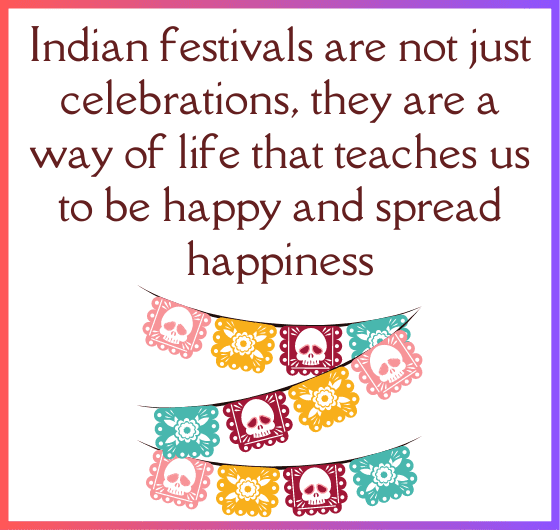
The role of Eid al-Fitr in spreading happiness and love
Eid al-Fitr, also known as the “Festival of Breaking the Fast,” is an important Islamic holiday that marks the end of Ramadan. It is a time for Muslims to come together and celebrate their faith, as well as to enjoy delicious food, give to charity, and spend time with loved ones.
But beyond these festivities, Eid al-Fitr holds a deep significance in promoting happiness and love among the community.
One of the main reasons that Eid al-Fitr is so important is that it symbolizes the completion of a month-long period of fasting and spiritual reflection. By abstaining from food, drink, and other earthly desires during Ramadan, Muslims are able to focus on their relationship with Allah, deepen their faith, and cultivate a greater sense of gratitude for their blessings.
This heightened spiritual awareness carries over into Eid al-Fitr, where Muslims can rejoice in their achievements and feel a sense of pride and accomplishment.
Moreover, Eid al-Fitr is a time of forgiveness and reconciliation, where people are encouraged to let go of any grudges or resentments they may be holding and to extend kindness and generosity to others. Through acts of charity, gift-giving, and spending time with family and friends, Muslims are able to strengthen their bonds with one another and foster a greater sense of community and belonging.
In essence, Eid al-Fitr is a celebration of the human spirit, of our ability to persevere through challenges, to come together in times of need, and to find joy and happiness in the midst of adversity. By embracing the spirit of Eid al-Fitr, we can learn to cultivate these qualities in ourselves and to spread positivity and love to those around us.
So let us celebrate this beautiful festival with open hearts and minds, and let us strive to embody the true essence of Eid al-Fitr every day of our lives.
“The happiness we find in Indian festivals comes from the joy of being with our loved ones and celebrating the simple joys of life.”
How Christmas Celebrations in India Promote Happiness
As the world gears up for Christmas, the holiday spirit is palpable in India too. Even though it’s not a traditional Indian festival, Christmas celebrations have become an integral part of the country’s diverse culture. The festival brings with it a sense of joy and togetherness that transcends all religions and beliefs.
The secret of happiness in Indian festivals lies in their ability to bring people together, and Christmas is no exception. From decorating the Christmas tree to exchanging gifts, the festive season is a time of joy and cheer for people of all ages.
Families and friends come together to bake Christmas cakes, sing carols, and enjoy the festivities.
For many in India, Christmas is also a time for giving back to the community. From organizing charity drives to volunteering at local shelters, people find ways to spread joy and kindness during the holiday season.
The celebration of Christmas in India is a melting pot of cultures, with influences from both the West and India. From midnight masses to colorful street parades, the festive season is a vibrant mix of traditions and customs.
At the heart of it all, the festival represents hope, love, and happiness. For many, it’s a time to reflect on the year gone by and to look forward to the future with renewed optimism.
In a world that can often be stressful and chaotic, the celebrations of Christmas in India offer a much-needed respite. The festive season reminds us to slow down, appreciate the simple pleasures of life, and to cherish our loved ones.
In conclusion, the secret of happiness in Indian festivals lies in their ability to bring people together and spread joy. Christmas celebrations in India are a testament to this, with their unique blend of cultures, traditions, and customs. As we gear up to celebrate the festival, let’s remember to embrace the holiday spirit, spread love and kindness, and enjoy the festivities with our loved ones.
“The joy and happiness that we experience during Indian festivals are not temporary, they stay with us forever as cherished memories.”
What lesson does Dussehra teach us?
Dussehra, a celebrated Hindu festival, imparts valuable lessons that are relevant to our lives. The festival teaches us the importance of standing up against evil forces.
It signifies the victory of good over evil, as depicted in the triumph of Lord Rama over the demon king Ravana. Dussehra inspires us to have the courage to confront and overcome the negativity and darkness within ourselves and in society.
It also emphasizes the significance of truth, righteousness, and justice. Dussehra teaches us to embody these virtues and strive for moral values in our actions.
Ultimately, the festival of Dussehra encourages us to lead a righteous and meaningful life, upholding goodness and making a positive impact in the world.
New Year’s Eve and its Impact on Happiness and Positivity
New Year’s Eve is a time of celebration and reflection for people around the world, and it is no different in India. The day marks the beginning of a new year and provides an opportunity for people to start afresh, set new goals and make resolutions.
But beyond the fireworks and parties, New Year’s Eve also has a deeper impact on happiness and positivity.
One of the key aspects of New Year’s Eve is the sense of hope and optimism that it brings. As people bid farewell to the old year, they also let go of the negative experiences and emotions that may have held them back.
This creates space for positivity and optimism, as people look forward to the new year with a renewed sense of purpose.
Another way in which New Year’s Eve impacts happiness is by bringing people together. Whether it’s with family, friends, or colleagues, the day is a time for socializing and connecting with others.
This can have a positive impact on mental health, as social support has been shown to reduce stress and improve well-being.
New Year’s Eve is also a time for reflection and gratitude. As people look back on the year that has passed, they may feel grateful for the positive experiences and lessons learned, which can increase feelings of happiness and contentment.
Additionally, setting goals and making resolutions for the new year can provide a sense of purpose and direction, which can also contribute to happiness.
In India, New Year’s Eve is celebrated with various customs and traditions. Some people light diyas and offer prayers to bring in positivity and good fortune, while others engage in festive activities such as decorating their homes and preparing special meals.
Regardless of the customs followed, the day is a time of celebration and joy, which can have a positive impact on happiness.
In conclusion, New Year’s Eve is more than just a time for fireworks and parties. It has a deep impact on happiness and positivity, bringing hope, social connection, gratitude, and a sense of purpose.
By embracing the customs and traditions of the day, we can tap into its power to create a positive start to the new year.
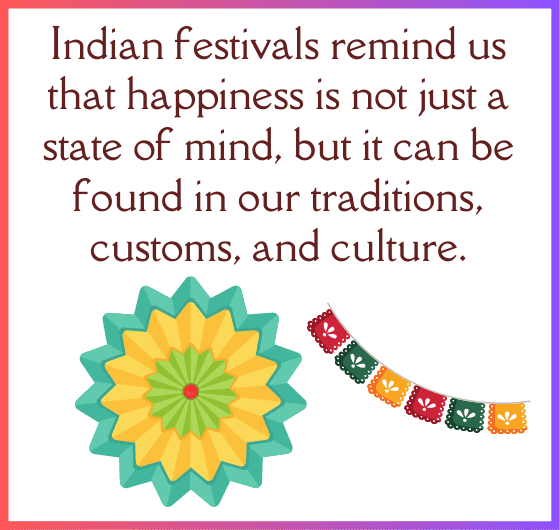
The relationship between Indian festivals and mental well-being
The Relationship Between Indian Festivals and Mental Well-Being: The Secret of Happiness
Indian festivals are a colorful and vibrant celebration of life, with deep spiritual and cultural significance. They bring people together, promote traditions and rituals, and most importantly, spread happiness and positivity. But did you know that these festivals can also have a significant impact on our mental well-being?
In this article, we’ll explore the secret of happiness that lies behind Indian festivals and how they contribute to our overall mental health.
The festive season in India begins with Navratri, a nine-day celebration of the divine feminine energy. It is followed by Dussehra, the triumph of good over evil, and Diwali, the festival of lights that symbolizes the victory of light over darkness.
These festivals are not just about external celebrations, but also about internal reflection and spiritual growth. They offer an opportunity to connect with our inner selves, forgive and forget past grievances, and start anew with renewed hope and positivity.
The significance of Indian festivals in promoting mental well-being lies in their ability to create a sense of community and belonging. Festivals bring people together, regardless of their social or economic status, and promote a sense of unity and harmony.
This sense of belonging has been shown to have a positive impact on mental health, reducing the risk of depression, anxiety, and stress.
Moreover, the rituals and traditions associated with Indian festivals provide a sense of structure and purpose to our lives. They give us a sense of identity and help us connect with our roots and heritage.
This connection with our cultural identity has been linked to better mental health outcomes, including increased resilience and self-esteem.
Indian festivals are also associated with acts of kindness, charity, and giving. During the festive season, people donate to the less fortunate, distribute sweets and gifts, and perform acts of service.
These acts of kindness not only benefit the recipients but also boost the giver’s mental health by increasing feelings of empathy, compassion, and self-worth.
In conclusion, the secret of happiness in Indian festivals lies in their ability to promote mental well-being by creating a sense of community, belonging, and purpose. They offer an opportunity to connect with our inner selves, reflect on our values, and spread joy and positivity to others.
As we celebrate these festivals, let’s remember their deeper meaning and embrace their power to transform our lives for the better.
Story: Teaching the Secrets of Happiness in Indian Festivals
Once upon a time, in a serene village in India, there was a wise guru named Swami Raman. He was known for his deep understanding of happiness found in the country’s vibrant festivals. One day, a curious student named Maya approached him, seeking guidance on unlocking the secret to happiness within these festive traditions.
Swami Raman greeted Maya with a warm smile and began sharing his wisdom. He explained that Indian festivals hold the key to true happiness. He started by talking about Diwali, the festival of lights. “Diwali teaches us to spread kindness and positivity,” he said. “Just as the lights brighten homes, our acts of compassion can bring joy to others.”
Next, Swami Raman spoke about Holi, the festival of colors. He said, “Holi reminds us to celebrate diversity and let go of judgments. By embracing different colors and accepting others, we open our hearts to happiness and love.”
Swami Raman then shared the significance of Raksha Bandhan, a festival honoring sibling relationships. “Raksha Bandhan teaches us the joy of giving and receiving love,” he said. “When we express gratitude for our loved ones, our hearts fill with happiness beyond any material possessions.”
Ganesh Chaturthi was the next festival Swami Raman discussed. He explained that it symbolizes overcoming obstacles with faith and determination. “Just as Lord Ganesha brings joy and prosperity, our perseverance in the face of challenges leads to lasting happiness,” he said.
Lastly, Swami Raman spoke about Eid al-Fitr, a festival celebrated by Muslims. He highlighted the importance of mindfulness and gratitude during this time. “Through self-discipline and counting our blessings, we cultivate inner peace and contentment,” he said.
Maya felt grateful for Swami Raman’s teachings and expressed her appreciation. He smiled warmly and encouraged her to embrace the festival lessons in all aspects of life.
With Swami Raman’s guidance, Maya embarked on a journey of applying the wisdom of Indian festivals. She discovered that happiness can be found not only during festivals, but also by embodying their values every day.
In conclusion, the story of Swami Raman and Maya teaches us that Indian festivals hold the secrets to happiness. By spreading kindness, celebrating diversity, cherishing relationships, overcoming obstacles, and practicing mindfulness and gratitude, we can unlock lasting happiness in our lives.
Interesting and unique facts related to “Unlocking the Secret of Happiness in Indian Festivals”:
1.. Festival of Lights: Diwali, known as the Festival of Lights, is celebrated across India and signifies the victory of light over darkness. It is believed that lighting diyas (lamps) during Diwali symbolizes the removal of ignorance and the awakening of knowledge, leading to inner happiness and enlightenment.
2. Joyful Colors of Holi: Holi, the festival of colors, is celebrated with immense enthusiasm. The throwing of vibrant colors represents the breaking down of social barriers and the celebration of unity and harmony. Playing Holi releases endorphins, the “feel-good” hormones, leading to an instant boost in happiness and joy.
3. Sacred Bond of Raksha Bandhan: Raksha Bandhan celebrates the special bond between brothers and sisters. The ritual involves sisters tying a sacred thread called “Rakhi” around their brothers’ wrists, symbolizing protection and love. Studies have shown that strong sibling relationships contribute to emotional well-being and happiness.
4. Ganesh Chaturthi and the Remover of Obstacles: Ganesh Chaturthi honors Lord Ganesha, the elephant-headed deity who is worshipped as the remover of obstacles and the god of wisdom and prosperity. Participating in the festivities and seeking Lord Ganesha’s blessings is believed to bring happiness, success, and the removal of life’s hurdles.
5. Inner Reflection during Eid al-Fitr: Eid al-Fitr marks the end of Ramadan, a month of fasting and spiritual reflection for Muslims. The practice of self-discipline, mindfulness, and gratitude during Ramadan fosters inner peace and contentment, leading to a deep sense of happiness and spiritual fulfillment during Eid al-Fitr celebrations.
6. Festive Communal Harmony: Indian festivals often bring people from diverse backgrounds and communities together in celebration. The spirit of unity and shared festivities promotes social bonding, fostering a sense of belonging and happiness among individuals.
7. Cultural Richness and Festive Diversity: India’s cultural diversity is reflected in its numerous festivals, each with its unique traditions and rituals. Exploring and participating in these festivals allows individuals to embrace different cultures, leading to a sense of appreciation, understanding, and happiness.
8. Festivals as Stress Relievers: Indian festivals provide an opportunity for people to take a break from their daily routines and immerse themselves in joyous celebrations. This break from routine and engagement in festive activities act as stress relievers, promoting relaxation and well-being.
9. Expressions of Gratitude: Many Indian festivals, such as Pongal and Baisakhi, involve expressing gratitude towards nature, harvest, and the divine. Cultivating an attitude of gratitude has been scientifically proven to enhance happiness and overall life satisfaction.
10. Generosity and Giving: Indian festivals often involve acts of charity and giving to the less fortunate. Generosity and acts of kindness during festivals not only bring happiness to the recipients but also create a sense of fulfillment and joy in the givers.
These fascinating facts highlight the diverse aspects of Indian festivals and their profound impact on unlocking happiness. Each festival offers unique rituals, traditions, and values that contribute to the well-being and happiness of individuals participating in these joyous celebrations.
Riddles make life better
Riddles related to “Unlocking the Secret of Happiness in Indian Festivals”:
Riddle 1: I am a festival of lights, spreading brightness all around. Ignorance fades as knowledge is found. What am I?
Riddle 2: I bring colors and joy, a celebration so grand. I unite people with hues across the land. What festival am I?
Riddle 3: Tying a thread, a bond so pure. Brothers and sisters, our love secure. Which festival am I describing?
Riddle 4: I am the elephant-headed deity, a remover of strife. Worshipped during a festival that brings joy to life. Who am I, and what festival is it?
Riddle 5: A month of fasting, self-reflection, and prayer. Joyful celebration follows, a time to share. What festival am I referring to?
Riddle 6: I mark the end of winter and the onset of spring. With bonfires and dancing, happiness I bring. Guess the festival’s name!
Riddle 7: I am a festival of harvest, gratitude, and cheer. Farmers rejoice as we gather near. Which festival am I?
Riddle 8: With sacred river baths, devotion fills the air. A spiritual gathering, a festival so fair. Name this auspicious event!
Riddle 9: I am a festival of unity and fasting for wives. Praying for their husbands, bringing joy to their lives. Can you guess the festival?
Riddle 10: I am a festival of flowers, devotion, and dance. Celebrating the eternal love of Lord Krishna’s romance. Identify this vibrant festival!
Answer 1: Diwali
Answer 2: Holi
Answer 3: Raksha Bandhan
Answer 4: Lord Ganesha, Ganesh Chaturthi
Answer 5: Eid al-Fitr
Answer 6: Lohri
Answer 7: Pongal
Answer 8: Kumbh Mela
Answer 9: Karva Chauth
Answer 10: Janmashtami
These riddles will surely challenge and entertain while highlighting the joy and significance of various Indian festivals in unlocking the secret of happiness.
How can I make my life better with the secrets of happiness from Indian festivals?
To make your life better by incorporating the secrets of happiness from Indian festivals, you can make simple changes that will bring more joy and contentment.
Indian festivals offer valuable lessons that can improve your overall well-being and happiness.
>> Start by practicing gratitude. Similar to festivals like Diwali and Pongal, develop a daily habit of appreciating the good things in your life.
Take a moment each day to think about what you’re grateful for, such as your health, relationships, or personal accomplishments. This will help you feel more thankful and increase your happiness.
>> Embrace diversity and foster unity, just like festivals like Holi and Eid al-Fitr do. Engage with different communities, learn about their traditions, and build connections.
By accepting and appreciating diversity, you’ll feel a greater sense of belonging and happiness.
>> Try mindfulness, inspired by festivals like Ganesh Chaturthi and Raksha Bandhan. Set aside time each day to meditate, practice deep breathing, or simply be present in the moment. This will reduce stress, increase self-awareness, and improve your well-being.
> Practice acts of kindness and giving, as encouraged by Indian festivals.
Help those in need through volunteering or small acts of kindness. Giving to others not only benefits them but also brings you a sense of fulfillment and happiness.
>> Finally, prioritize your family and relationships, just as festivals like Raksha Bandhan do. Spend quality time with loved ones, express love and appreciation, and create lasting memories.
Nurturing your relationships will bring you greater happiness and fulfillment.
By applying these simple practices in your life, you can unlock the secrets of happiness from Indian festivals. Embrace gratitude, celebrate diversity, practice mindfulness, show kindness, and prioritize relationships.
As you incorporate these principles, you will experience positive changes, increased fulfillment, and a deeper sense of happiness in your life.

